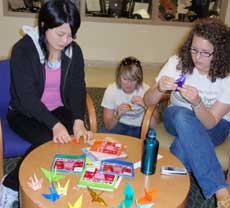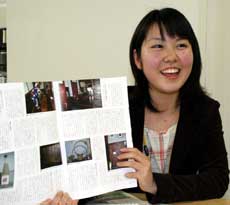
Former junior writers take active paths
|
Kyoko Niiyama
A former junior writer, Kyoko Niiyama, 19, has studied in the U.S. state of Ohio since June 2008. She is now a second-year student at Mount Union College. In a presentation about peace, she described the damage in Hiroshima caused by the atomic bomb. The college has kept photo panels used for one of the A-bomb exhibitions that the City of Hiroshima has held throughout the United States, so she displayed these pictures at her presentation. After the presentation, she was asked by an American classmate, "How could atomic bomb survivors appeal for peace without feeling resentment toward the United States?" Kyoko replied, "I think they were so desperate to live that they had little energy for bitterness." Kyoko is now trying to establish a club at her school to engage in peace activities with her friends. She said she wants the American people to know more about the atomic bombings and raise their awareness of peace issues. "I want to help create a bridge between students in Hiroshima and in the United States," she explained. (Chisa Nishida, 14) |
|
Aya Nakashige
Another former junior writer, Aya Nakashige, 19, a student at the University of Shimane, publishes a local newsletter titled Nonbiri gumo ("Carefree Clouds") and writes articles for a newspaper produced by university students from all over Japan. When Aya was in her second year of high school, she applied to be a junior writer in order to learn things she wasn't able to study at school. She served as a junior writer for a year and a half, listening to stories about peace from people of different generations. As a result, she grew in her ability to develop her own ideas and deliver them clearly. To make use of this ability, she began her writing activities. She now writes about local people. Through her work, she has found that listening to others' experiences is helping her to grow and develop her skills. She told us that she wants to communicate with a lot of people and receive inspiration from them. (Chisa Nishida, 14) |
|
Madina Sadykova
Madina Sadykova, 20, served as a junior writer while studying at Sanyo Girl's High School in Hiroshima. After returning to her native Kazakhstan, she is now studying medicine at a university and teaches Japanese once a week to about 20 junior high, high school, and university students. She not only uses textbooks to teach Japanese vocabulary and grammar, she also teaches about peace. As one resource, she uses the peace song titled "Our Wish," which was reported on in the first issue of Peace Seeds. She chose the song because she was deeply moved when she recognized that "songs can serve as a bridge between people in different countries with different languages." She hopes to tell children in her country what she learned about peace in Hiroshima. "Someday I want to create an opportunity for my Japanese students and children in Hiroshima to interact," she said. (Rika Shirakawa, 12) |
 Discussion among current and former junior writers
Discussion among current and former junior writers 
| Current junior writers: Yuki Sakata, Shiori Kosaka, Mako Sakamoto Former junior writers: Ryu Kanchika, Aya Nakashige, Yutaro Honkawa |
Inspiration from overseas visitors / Establishing a peace club / Taking on new challenges
This is the 50th issue of Peace Seeds. As junior writers, you have been here at different times, but what has impressed you about the work of a junior writer?
| Click to view the discussion by current and former junior writers. |
Aya: I met people from different generations. When I felt anxious about what to do after I graduated, I heard some helpful stories during my interviews.
Shiori: I can experience many things that I can't at school and I think it's broadening my perspective.
Ryu: I clearly remember covering the Peace Memorial Ceremony. It was especially stimulating when I interviewed visitors from overseas and found their ideas were different from mine.
Shiori: I got flustered when people spoke to me in English.
Mako: It made me nervous to start talking to strangers in Peace Park. But it was fun to get so many different answers to the same questions.
Aya: For issue 13, we conducted interviews with professional journalists who cover peace issues and I discovered how to ask good questions to find out people's real feelings. I think this can be applied to daily life, too.
What have you found difficult?
Mako: I didn't know very much about postage stamps so "Peace Postage Stamps," for issue 31 and 32, was hard for me.
Yutaro: I had trouble coming up with good questions for "Peace Songs," issue 27, because I'm not very familiar with music.
Yuki: I run into a lot of special terms that are difficult to understand.
Shiori: Not only special terms, but a series of difficult words is hard, too. If I can't understand the meaning clearly, I'm unable to ask suitable questions and so I get confused when I write the article.
Yutaro: It's important to prepare well in advance. It might be helpful, not only coming up with questions for the interviews, but also having some image of your article or even making an outline of the article you'd like to write.
What sort of results has Peace Seeds produced?
Ryu: After the first issue, which included an article about a peace song called "Our Wish," my school got involved by creating a verse for this song, too.
Yuki: A teacher who was inspired by Peace Seeds organized a Peace Club at our school.
Aya: My ideas about peace have grown. Before I began working as a junior writer, "peace issues" only equaled "A-bomb issues," something in the past.
Yutaro: When our topic was the environment, I discovered that there's a link between environmental issues and peace issues.
Ryu: Now that I'm no longer a junior writer, I envy the sort of projects you're working on, like the project to invite President Obama to Hiroshima.
What steps should we take for the future of Peace Seeds?
Shiori: When I write articles, I want to do better at expressing my thoughts and my impressions from my interviews, and I want more adults to know what we think.
Yutaro: For adults to be interested in your writing, you need to develop strong ideas. A variety of experiences will deepen your thoughts.
Mako: I hope people all over the world come to know about Peace Seeds.
Ryu: By moving forward, step by step, from an objective base for your articles, your writing can become more interesting. By changing things within yourself, you'll be able to take on new challenges.


